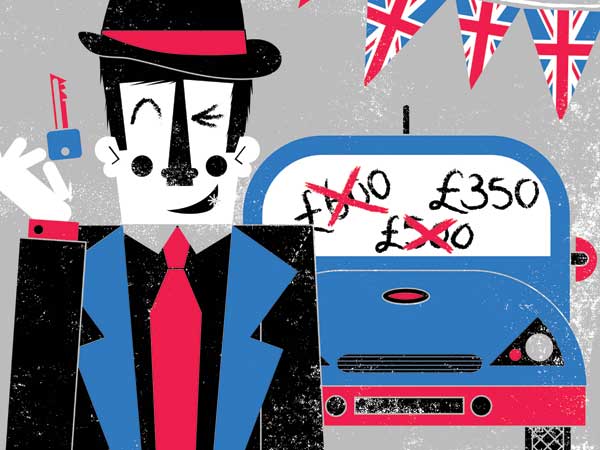By Matt Copeland | 1 March 2013
Negotiating is a vital business skill for all public sector managers and increasingly so for finance professionals. But many end up acting as if they’re haggling over a used car

All managers negotiate on a daily basis, whether it’s over the best way to distribute the departmental budget or whose turn it is to buy lunch. If it involves other people, and pretty much everything does, it involves negotiation. But this is an area with a big skills gap.
When faced with a negotiation, managers have a tendency to go straight into ‘haggling and bartering’ mode, approaching discussions in the same way they might go about buying a car. Both parties set out their positions at extreme and opposite ends of the scale, followed by the obligatory dance round the table and movement towards the middle, as each makes predictable concessions, before they end up just splitting the difference. Neither side is really happy with the result and a lot of time has been unnecessarily wasted.
For finance professionals, negotiation skills are becoming more important, given the central strategic role they now assume in the public sector. The economic drivers of revenue models and streams are all changing, with innovation an imperative, and novel situations and requests increasingly the norm. Finance professionals are at the heart of it all.
This is particularly true with the civil service reform agenda. Among other things, this calls for smaller central government, greater collaboration, more value for money and a focus on outcomes rather than outputs.
Finance professionals should be viewed as partners in enabling future growth and innovation, rather than just the risk-averse ‘gatekeepers of the organisational jewels’. However, this means they first need to think, act, communicate and influence in that way. Here are ten tips for negotiating in a way that will leave all parties satisfied.
- Get it all out into the open
People will generally bring a set of preconceived notions to the negotiating table. For example, the other party might have heard rumours about your department or organisation or have a ‘history’ with your team. The key to getting a negotiation off to a good start is to find out what the other parties’ prejudices and assumptions are first and then deal with them, before getting into the details of your argument. Acknowledge these assumptions, recognise them and deal with them explicitly.
- Flex your approach
Everyone has a preferred negotiating style – but your favourite method might not be the most appropriate if the other party has a radically different approach. Make sure you are aware of your own strengths and weaknesses and look out for the verbal and physical cues that will give you an insight into the other person’s natural communication style. If you know what makes the other person tick, you can adapt your style appropriately to make sure that you have a productive dialogue with them – and that your message gets across, instead of falling on deaf ears.
- Know who you’re negotiating with
Dig deep and find out what is really pushing the party you are negotiating with. You are dealing with a person, not a business, and all individuals have their own agenda. Make sure you are clear about what’s behind the stance they are taking. You need to identify exactly what they want to gain from the process – what their ‘interest’ is rather than just their stated ‘position’.
- Take off your blinkers
People can enter a negotiation with ‘tunnel vision’ or think they already know the answer to the problem. Don’t try to come up with a solution too soon. If you consider the widest range of possibilities available, you are more likely to come up with something that increases the value for both parties. At the very least, you could find a way of making a concession that is of low value to you but is perceived as high value by the other party.
- Use objective standards
Come to the table prepared with information about best practice, benchmarks from other businesses and accepted standard rates. People usually appreciate having a framework to negotiate within – and if you come to an agreement within that, they will feel they have been fairly dealt with, regardless of outcome.
- Be authoritative but know your limitations
Not all negotiation situations are well organised and prepared. Occasionally, you will have to negotiate ‘off the cuff’ and sometimes you will not be the correct person to resolve the issue. Here you need to ask: ‘why are they asking me?’ Often it is because it is your field of expertise and you will know the answer or how to begin the process of finding solutions. If not, they have asked the wrong person. There is nothing wrong with admitting when you don’t know. Don’t apologise but be confident and authoritative when it is your area.
- Never be afraid to ask
The best way to learn from a discussion is to ask questions, watch and listen to everything – be curious. This buys you time and, most importantly, enables you to understand what the other party is really concerned about, what their assumptions are and the style of communication most likely to be effective with them. Information is power…
- Don’t react, seek evidence
Others might not share your wish for collaborative and productive negotiation and will attempt adversarial approaches. We have all been in those meetings where, whatever we say, someone will continually disagree. Do not react or defend your view, ask them to back up their stance. Then modify your approach to address what you have learnt from the conversation. Asking for evidence avoids you adopting a defensive stance and helps you to fully understand their point. It also tends to unearth a better and collaborative solution.
- Use the 'triple E’ for evaluation
At all stages of a negotiation, evaluate possible solutions as though you were buying a service or product. Use the three ‘Es’: economy, efficiency, effectiveness. Is the solution ‘economic’ – have you minimised the cost of resources used or required? Is the solution ‘efficient’ – will there be a positive relationship between the output from goods or services and the resources to produce them? Is the solution ‘effective’ – will the result of the negotiation compare favourably to your intended outcome?
- Put theory into practice
Most of these guidelines should seem like common sense, but many of us don’t put them into practice in particular ‘negotiating’ situations. Awareness of the varying factors is the first key step, then it’s a question of practise, practise, practise…
Matt Copeland is a faculty member and negotiation specialist at Ashridge Business School



















